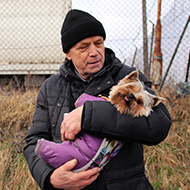RSPCA donates £20,000 to help animals in Ukraine

Rescue organisations in Ukraine are working tirelessly to care for animals in need.
The RSPCA has donated £20,000 to the international animal charity FOUR PAWS, which is raising funds to aid animals in war-torn Ukraine.
FOUR PAWS intends to channel the funds raised from its campaign towards on-the-ground organisations in Ukraine that are working tirelessly to care for animals in need.
RSPCA director of advocacy and policy Emma Slawinski commented: "The tragic human disaster in Ukraine has had a knock-on effect for the animals there too. With many of Ukraine’s animal welfare services now curtailed or shut down, we are proud to be able to help on-the-ground charities with our donation and would urge others to help if they can via the FOUR PAWS website.”
Sonul Badiani-Hamment UK, country director FOUR PAWS UK, added: “We are incredibly grateful to our friends at the RSPCA for their support. Not only have they kindly donated to our work in Ukraine, but they are also sharing how their supporters can be involved too. This means we can ensure help is provided right where it is needed, in shelters and at railway stations.”
“Our teams have already delivered food to local shelters to assist them in caring for the growing number of animals in their care, whilst also offering supplies and support for those fleeing the country. We want to do all we can to make sure the animals are prepared for the next step in their journeys and thank everyone for supporting us in making this possible.”
Earlier this week, the UK government announced free quarantine services for Ukrainians seeking refuge in the UK with their pets. The RSPCA has been working behind the scenes with the government to help make this a possibility.
Emma added: "Pets are parts of our family and during the horrific recent events in Ukraine, we've seen individuals go to incredible lengths to ensure their pets get to safety. We're pleased that for those refugees coming to the UK they won't have the added heartbreak of leaving their pets behind.”



 The latest
The latest